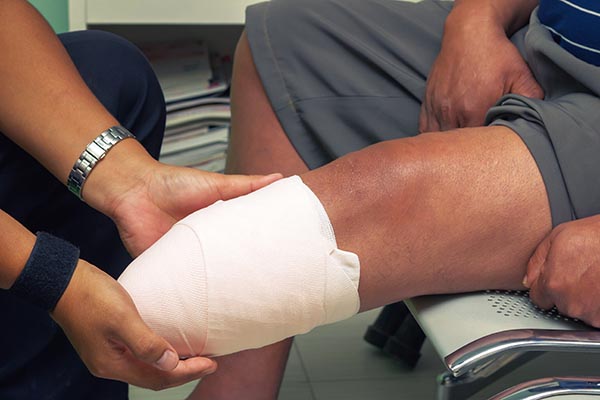Attorneys for Workplace Amputation Accidents

Attorneys for Workplace Amputation Accidents
Amputations can be incredibly traumatic events for amputees, with these life-changing injuries meaning months—if not years—of physical therapy, mental health treatment, physical pain, and learning to use prosthetic limbs. Amputation victims, if injured as a result of another party’s negligence or malice, deserve maximum compensation to cover their pain and suffering as well as medical bills and lost wages.
When looking for an amputation attorney, turn to the legal team with decades of experience holding responsible parties accountable: Susan E. Loggans & Associates.
Retain an Amputation Injury Lawyer
If you had to have a body part amputated because of an accident caused by another party’s negligence, retain legal counsel as soon as possible. Susan E. Loggans & Associates represents clients injured in workplace accidents and more.
Dr. Susan E. Loggans is an experienced personal injury lawyer who can investigate the cause of your injury and hold all negligent parties accountable. She will provide a complete, free case evaluation when you call (312) 201-8600.
Susan E. Loggans & Associates represents clients on a contingency-fee basis, which means people do not pay anything if they do not receive a monetary award.
Overview of Amputation Injury Lawyer in Chicago
Common Types of Amputation Injuries
Common Causes of Amputations
Damages Awarded in Amputation Cases
Amputation Attorney FAQs
What to Do If You Experience an Amputation Injury
Find the Best Amputation Lawyer
Common Types of Amputation Injuries
Common amputation injuries involve the loss of a limb, such as a finger, toe, or foot. There are two primary types of amputations: traumatic amputation and non traumatic amputations.
Traumatic amputations are immediate and severe. They involve accidents resulting in serious injuries that result in amputations; many traumatic amputations are the result of motor vehicle accidents.
Non-traumatic amputations are those that develop over time, commonly due to disease; surgical amputation is a type of non-traumatic amputation.

Common Causes of Amputations
Amputations are frequently the result of catastrophic accidents, although the specific types of incident often vary.
Some of the most common causes of amputation injuries include:
- Traumatic accidents. Traumatic accidents causing catastrophic injuries that lead to amputations commonly include motorcycle accidents, car accidents, and truck accidents or use of defective products.
- Disease. Cancer, diabetes, and vascular diseases can lead to amputations to prevent disease spread and remove necrotic (dead) tissue.
- Infections. Certain infections can result in amputations to prevent infection spread.
Less common causes of amputation include medical malpractice, where a healthcare provider amputates a limb that could be saved or provides substandard care that results in injury or infection, resulting in limb amputation.
Damages Awarded in Amputation Cases
When an amputation is the result of another party’s negligence, a victim can seek compensation from the negligent party. Money awarded in civil actions is referred to as damages, and there are multiple kinds of damages.
Compensatory damages are amounts that are intended to replace what the victim lost, and they are usually the sum of economic damages, noneconomic damages, and punitive damages.
Economic Damages
Economic damages (also referred to as economic losses) refer to quantifiable monetary losses the victim experienced, such as:
- Past and future medical expenses
- Past and future lost wages
- Future economic losses/loss of earning capacity
- Property damage
- Any other out-of-pocket expenses
Noneconomic Damages
Noneconomic damages are much harder for the parties involved to agree on, as such damages are largely forms of the very real impact an injury has had on a person’s life that cannot be calculated. Noneconomic damages are intended to compensate victims for the psychological ways injuries have affected their lives.
Common types of noneconomic damages award in amputation cases include, but are not limited to, the following:
- Disability or disfigurement
- Pain and suffering
- Loss of consortium
- Loss of enjoyment/loss of quality of life
- Mental anguish/emotional distress
Punitive Damages
In certain cases, victims may also be entitled to punitive damages. Illinois Pattern Civil Jury Instruction 35.01 establishes that, in addition to compensatory damages, the law permits juries under certain circumstances to award punitive damages.
A jury can award punitive damages to punish a defendant and discourage them and others from similar conduct if the jury 1.) finds that a defendant’s conduct was fraudulent, intentional, willful, and wanton and approximately caused injury or damage to the plaintiff and 2.) believes that justice and the public good require it.
Illinois Pattern Civil Jury Instruction 35.01 also states that jurors should consider the following three questions when arriving at their decision as to the amount of punitive damages:
- How reprehensible was the defendant’s conduct?
- What actual and potential harm did the defendant’s conduct cause to the plaintiff in this case?
- What amount of money is necessary to punish the defendant and discourage the defendant and others from future wrongful conduct [in light of defendant’s financial condition]?
Amputation Attorney FAQs
How much is an amputated leg worth in a lawsuit?
The Illinois Workers’ Compensation and Occupational Diseases Act sets a value on certain body parts, expressed as a number of weeks of compensation for each part. In permanent partial disability benefits cases, for example, an amputated body part is considered a 100 percent loss and a victim is awarded the entire number of weeks listed on the chart.
What not to say to an injury lawyer?
When speaking with an amputation injury attorney, it’s best to be as honest as possible. Do not exaggerate injuries or speculate about accident causes; only provide facts and documentation to back your claims.
Who can file an amputation injury claim?
Anyone who experienced an amputation as a result of another party’s negligence or malice can file a civil suit.
How can an amputation attorney help me with my case?
An amputation attorney can help you file a case with a greater chance of securing a winning verdict.
Navigating the legal system can be difficult, especially if you or a loved one is already recovering from severe injuries like amputations. An experienced law firm can help you or a loved one better understand your legal options, odds of winning a case, what documents you need to prove your claims, and more.
How do I find the best amputation attorney near me?
If you’re looking for the best amputation attorney near you, look to one with decades of experience winning in personal injury claims: Susan E. Loggans & Associates.
What to Do If You Experience an Amputation Injury
If you or a loved one has experienced an amputation as a result of a negligent party, the following steps may help you pursue a civil case:
- Collect any evidence of the accident, including videos and photos.
- Collect all records of medical treatment.
- Document all forms of financial burdens related to the accident, including medical care costs and potential loss of wages.
- Do not speak to any insurance company representatives until retaining legal counsel.
- Seek the help of an experienced law firm right away to avoid issues with statutes of limitations.

Find the Best Amputation Lawyer with Susan E. Loggans & Associates
Did you recently have any part of your body removed because of an accident caused by another party’s negligence? Contact Susan E. Loggans & Associates.
Chicago personal injury attorney Dr. Susan E. Loggans represents individuals who have experienced significant harm from negligent parties. Call (312) 201-8600 or fill out the online contact form below to have our lawyer review your case and discuss your legal options during a free initial consultation.
